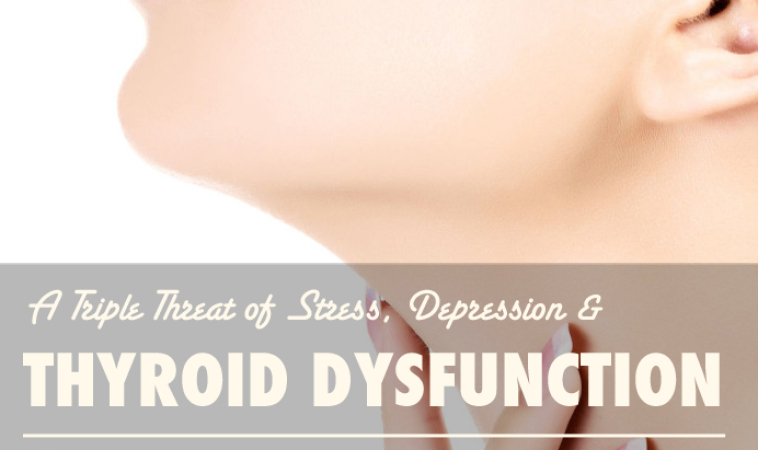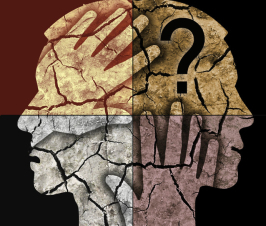Dr. Jennifer Bahr, ND
@DrJenniferBahr
Mental health and endocrine health are intimately related. Dysfunction of the endocrine system often causes both mental and physical symptoms. Likewise, mental health conditions often cause endocrine dysfunction. This occurs through a (sometimes vicious) biopsychosocial cycle where alterations on one area lead to a cascade of effects in the other. For some, this connection is the key to finding relief where other treatments have failed. Taking these connections into consideration can be important not only for effective treatment, but for promoting resilience in mental and physical health.
Depression
Let’s use depression as an example to explore this connection. People often use the word depression generically to mean sadness, lack of focus, loss of motivation, or generally feeling “low.” Clinically, The DSM-5 defines depressive disorders as being characterized by a persistent feeling of “sad, empty, or irritable mood, accompanied by somatic and cognitive changes that significantly affect the individual’s capacity to function.”¹ The term somatic changes refers to the physical symptoms people who are suffering depression often experience. These can be a general feeling of physical slowness, aches and pains, headaches, gastrointestinal complaints and more. Cognitive changes refer to the mental confusion or “fogginess” and fatigue that people describe. In short, clinical depression impacts both physical and mental health.
Hypothyroidism
Now let’s take a look at an endocrine disorder – hypothyroidism. This is a condition where either the thyroid gland fails to produce enough hormone or the body fails to respond to the hormone. When it is healthy, the thyroid helps to regulate much of our metabolism. When it is unhealthy we will see the signs and symptoms of hypothyroidism which include cold intolerance, constipation, dry skin and hair, slow heart rate, weight gain, fatigue, and depression. Not everyone who has hypothyroidism will experience all of these symptoms. Some may have only the slowness, depressed mood, and fatigue.
Now for the kicker – depression may be caused by hypothyroidism, and depression can trigger or worsen hypothyroidism. The use of thyroid hormone replacement to treat depression that is not responding to typical antidepressants is well documented in the medical literature. In fact, a review² of several of these studies found that hypothyroidism is significantly implicated in recurrent or treatment resistant depression. These studies showed that giving thyroid hormone actually improved depression. Unfortunately, some treatments that are used for more severe depression actually interfere with thyroid function. Lithium is the most well known of these therapies. Lithium reduces the amount of iodine available to the thyroid. Iodine is crucial for the production of thyroid hormone, so less iodine in the thyroid gland means less hormone will be available to the body and signs of hypothyroidism kick in.
So we see an example of the bio (the thyroid and its hormone) and psycho (symptoms of depression) interacting, but how does the social come into play?
Stress
Stress impacts our mental and physical health profoundly. I am sure as you read this you can recall a time in your life when you were under a high amount of stress. You probably felt more irritable, had a harder time focusing, may have been less interested in going out with friends or doing things you normally like to do, or even had changes in your sleep. During these times you probably ate differently, exercised less, and may have even gained some weight. When you feel stressed, your body releases the hormone cortisol. This hormone comes from the adrenal glands. When it is released in high amounts it can block the release of thyroid hormones. Without getting too far into the physiology and pathology weeds, it is important to know that uncontrolled stress has significant impact on both your endocrine and mental health.
Now let’s imagine that all of these systems were out of control. Your thyroid isn’t working well so you feel fatigued and depressed. When you are depressed it impacts your work and social life, so you feel more stress. Your body responds by increasing the release of cortisol, which then reduces your thyroid production even more, making you feel more fatigued and depressed. This is the somewhat vicious aspect of the cycle. However this can be reversed. Our bodies are incredibly resilient, so effective treatment in one area will affect other areas as well. Reduction of stress reduces the release of cortisol, which then allows for better production of thyroid hormone. Stress reduction through mindfulness practices has also been shown to improve outcomes in depression.³
Optimal interventions include treatment of all three areas – biological, psychological, and social – with an emphasis on stress management. There are many safe and effective natural treatments that can help you to accomplish this, the specifics of which will be addressed in future articles.
Sometimes mental health conditions aren’t solely mental health. Taking the whole person and whole body into consideration is vital to achieving health. As I mentioned at the beginning, I have found that resilience is the true hallmark of mental and physical health. When we are resilient, we can bounce back from the sad or stressful days. We regain energy and focus. Aches and pains don’t last more than a few days. By understanding the nuances of how the mind and body interact we can utilize natural therapies to improve our resilience and take control of how we feel.
 Dr. Jennifer Bahr, ND is a licensed naturopathic doctor practicing in San Diego, CA. She focuses on the treatment of mental health and endocrine conditions with expertise in mood disorders and child/adolescent mental and behavioral health. She is also adjunct faculty at Bastyr University California and is the vice president and legislative chair for the California Naturopathic Doctors Association. Dr. Bahr received her Doctor of Naturopathic Medicine from Southwest College of Naturopathic Medicine where she focused her clinical studies on homeopathy, nutrition, mental health, and pediatrics.
Dr. Jennifer Bahr, ND is a licensed naturopathic doctor practicing in San Diego, CA. She focuses on the treatment of mental health and endocrine conditions with expertise in mood disorders and child/adolescent mental and behavioral health. She is also adjunct faculty at Bastyr University California and is the vice president and legislative chair for the California Naturopathic Doctors Association. Dr. Bahr received her Doctor of Naturopathic Medicine from Southwest College of Naturopathic Medicine where she focused her clinical studies on homeopathy, nutrition, mental health, and pediatrics.
References:
- American Psychiatric Association. (2013). Diagnostic and statistical manual of mental disorders(5th ed.). Washington, DC: Author.
- Howland, R.H., (1993). Thyroid dysfunction in refractory depression: implications for pathophysiology and treatment. Journal of Clinical Psychiatry. 1993 Feb;54(2):47-54.
- Teasdale, John D.; Segal, Zindel V.; Williams, J. Mark G.; Ridgeway, Valerie A.; Soulsby, Judith M.; Lau, Mark A. (2000). Prevention of relapse/recurrence in major depression by mindfulness-based cognitive therapy. Journal of Consulting and Clinical Psychology, Vol 68(4), Aug 2000, 615-623.

















